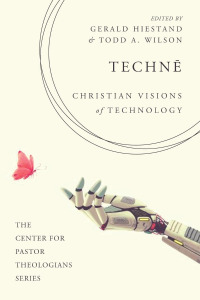[ad_1]
Friday, March 22, 2024

 As a part of the scholar fellowship program on the Heart for Apologetics and Cultural Engagement, we work with our scholar fellows to develop e book critiques about vital books that overlap their pursuits with these of the Heart. The next assessment of Gerald Hiestand’s and Todd A. Wilson’s Technē is a part of that ongoing initiative.
As a part of the scholar fellowship program on the Heart for Apologetics and Cultural Engagement, we work with our scholar fellows to develop e book critiques about vital books that overlap their pursuits with these of the Heart. The next assessment of Gerald Hiestand’s and Todd A. Wilson’s Technē is a part of that ongoing initiative.
Way back there was a metropolis with grand aspirations. The folks of this metropolis got down to accomplish a feat of each know-how and engineering: “a tower with its high within the heavens…lest [they] be dispersed over the face of the entire earth” (Genesis 11:4). Whereas the account of Babel is just one piece of the lengthy story of humanity’s technological development, our present period of smartphones, synthetic intelligence, genetic engineering, and different wonders appears disconnected from the warnings and knowledge inherent in these tales of the previous. Contemplating humanity’s advanced relationship with know-how, how ought to the church reckon with the seemingly ceaseless stream of moral challenges posed by new applied sciences? Gerald Hiestand and Todd A. Wilson edited Technē: Christian Visions of Expertise to current the distinctive views of fourteen authors who draw on the sources of theological research, biblical anthropology, and church historical past to handle a wide range of technological points.
Expertise and the Human Situation
Whereas know-how has superior in a myriad of kinds all through historical past, its improvement has mirrored a couple of central themes. As an illustration, as Christopher Ganski states, “know-how at its coronary heart all the time raises questions of what it means to be a human being” (82). Our creations replicate our personal nature, and thus anthropology. Consequently, a number of of the authors embrace substantive sections detailing how a biblical understanding of humanity impacts their particular matters.
The advanced moral and philosophical issues regarding synthetic intelligence necessitate a strong anthropology. When we’ve a transparent understanding of human id, we’re extra outfitted to hunt solutions to questions of consciousness and ethical company. For instance, Bruce Baker argues that machines won’t ever attain consciousness primarily based on the transcendent and non secular nature of humanity. Then again, Missy DeRegibus says that whereas “it appears unlikely that computer systems will find yourself possessing the consciousness and qualia essential to turn into ethical brokers,” it isn’t not possible (145). Contemplating this, she stresses the significance of acknowledging the goodness of our bodily embodiment as a part of the biblical witness to the character of what it means to be human. Her declare contrasts with the claims of secularists who assert that intelligence is the basic facet of humanity. If the thoughts is the one necessary a part of the human particular person, then the physique is diminished to being “the appendix that’s not wanted,” an unlucky leftover that solely will get in the best way. As an alternative, DeRegibus reminds her readers of the best endorsement of the importance of bodily embodiment in historical past: the incarnation. Within the incarnation, God embodies flesh and thus unquestionably grounds the worth of all elements of humanity, together with each the psychological and the corporeal. As synthetic intelligence continues to turn into extra superior, remembering this biblical reality will present knowledge to the church as new questions come up concerning the traits of humanity.
Reproductive know-how is one other space of moral controversy that calls for a rigorously fashioned biblical view of human id. Nathan Barczi asks how our definition of the imago Dei impacts the moral questions of gene enhancing. He argues for a vocational (fairly than practical) view of the picture of God. This vocational view asserts that the first distinction between humanity and the remainder of creation “shouldn’t be within the first occasion a set of capacities, however a calling” (155). In advocating for this view, he upholds the humanity of unborn embryos even when they could not show sure “humanlike” traits equivalent to rationality. The unborn is efficacious not merely due to a number of qualities it has however due to its relationship with its creator (see Nicholas Wolterstorff, Justice, 389–393). After defending the personhood of the unborn, he warns towards the dehumanization that emerges from sure types of genetic experimentation.
A Have a look at the Previous
The challenges posed by technological development are many. To assist make sense of the “extensive, wild, and unwieldy world which is modern Christian discourse on the query of know-how,” it’s sensible to show to the knowledge of the Christian custom (16). The authors of Technē persistently draw on Christian theologians from all through historical past. For instance, Jonathan Huggins engages with the works of Saint Augustine and Jonathan Edwards to attract conclusions about know-how because it pertains to leisure, distraction, and wonder. His insights present the significance of asking how our practices could or could not contribute to a flourishing life.
Jennifer McNutt offers an interesting case research of the interaction between the church and know-how. Particularly, she discusses the very important position of the printing press within the Protestant Reformation. Not solely was the printing press itself key to the dissemination of the Reformers’ writings, however the technical specialists of the day additionally performed an indispensable position. A lot of the success of Reformers equivalent to Luther and Calvin rested largely on their willingness to cooperate with those that operated the printers. In reality, a few of these operators, killed for his or her help of the Reformation, had been “added to the martyrologies of their day as exemplars of what it meant to advance the true church” (231). When taking a look at how you can handle know-how in our personal age, we should always acknowledge the willingness of those that got here earlier than us to accomplice with those that had been the technological specialists of their day.
A Look to the Future
Technē: Christian Visions of Expertise brings to the reader’s consideration a wide range of points discovered within the overlap between theology and know-how. It offers a wonderful springboard for these within the complexities of technological ethics whereas additionally offering common rules that apply to all areas of know-how. As a result of Technē is a group of works by completely different authors, it doesn’t all the time handle points in as a lot element as may be useful. Nevertheless, what it lacks in depth, it makes up for in breadth. Expertise now defines our lives in methods we frequently don’t discover. The long run will convey much more moral questions regarding know-how that believers should reply. Hiestand and Wilson contribute to the duty of teaching the church in order that we could also be knowledgeable in our responses to a quickly altering world whereas additionally grounding the reader in what stays unchanged: Christ, our basis.
Cameron Bonin (or C. S. Bonin, in imitation of one in all his favourite writers) is an undergraduate scholar at Liberty College working towards a level in Pc Science: Software program Engineering with minors in Theology and Apologetics. His educational pursuits embrace theoretical pc science and the methods during which this self-discipline can present distinctive insights into theological questions. When he’s not spending his time deciding whether or not he desires to pursue graduate research in Pc Science or in Theology, he enjoys touring, watching the blizzard, and studying from others.
[ad_2]
Source link




